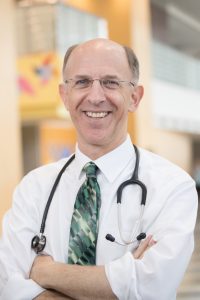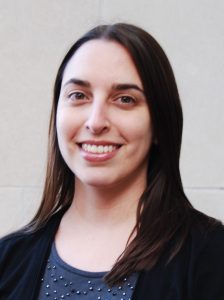Story originally published in UNC Health Talk
—————————————————————-

At some point, all children transition from pediatric to adult healthcare providers. But for patients with cerebral palsy and their families, the change can be especially complicated. That’s why it’s important that their healthcare team starts the process early and offers guidance and support through this transition over the course of several years.
Cerebral palsy describes a group of disorders that affect a person’s ability to control their movement and maintain balance and posture. People are either born with cerebral palsy due to abnormal brain development, or it is a result of an injury to the brain that happens during or soon after birth.
People living with cerebral palsy differ greatly in how they are affected. Some forms of the condition are so mild, you might not be able to tell someone has it simply by looking at or talking to them. Other forms can cause a person to be completely dependent on others for even the simplest task.
Some people with cerebral palsy experience intellectual disability, seizures, feeding difficulties, scoliosis, vision and hearing impairments, and many other conditions. And while therapy (physical, speech, occupational) and medications may help treat the symptoms, cerebral palsy never goes away. Many will need specialized medical care throughout their lives.
Planning for the Future Begins Early
“My personal goal whenever I see a child for the first time is to try to look into the future and see them as the person they are yet to become,” says UNC Health pediatric rehabilitation physician Joshua Alexander, MD. “I’m always thinking about how to get them to adulthood as happy, as healthy and as independent as possible.”
Dr. Alexander has been diagnosing and treating children with cerebral palsy for more than 30 years.
When he starts treating patients, they’re usually infants or toddlers, so he works closely with the parents and shares what he’s learned throughout the years that can help them. “I’ve been blessed to be able to watch many of my patients go from childhood to adulthood, and sometimes become parents themselves,” he says.
Focusing on a Growing Child’s Needs
When they are young and growing fast, patients and their families see Dr. Alexander several times a year. He checks the child’s strength, coordination, balance, muscle tone and posture. They discuss how the child is doing with any therapy they are receiving, and what is or isn’t helping. The child’s equipment—braces or wheelchairs, for example—will need to be refitted, and medications may be used to improve their health or function as they grow.
Depending on the child’s condition and the family’s needs, the frequency of their visits may slow down to once or twice a year as the child gets older.
When the child is about 10 years old, Dr. Alexander starts addressing his questions to the patient, not to the parents. This is a first step in starting to give the child responsibility for their own health.
“This can be challenging for the family,” he says. “Parents are so used to answering for their child, and it’s important for them to practice letting go of this responsibility over time. We know it’s hard to change that dynamic, so we take it slowly and don’t change everything at once.”
As they become teenagers, these children and adolescents face new challenges.
“Middle school can be tough, whether you have a disability or not,” Dr. Alexander says. “I talk to them about how everybody has strengths and weaknesses, and how we all do better when we have the support of others. And I remind them that they can be there for their friends and family, regardless of any disability.”
A Social Worker Helps with the Transition
When a patient turns 14, Dr. Alexander adds a clinical social worker to the care team to help the child and family plan for the years ahead.
The social worker helps patients and families set goals for healthcare, education and social engagement, and identifies resources in the community.
“I like to complete an assessment of every patient and family to start, and then check in with them again every year to year and a half,” says Mary Tyler “MT” Fore, UNC Health clinical social worker and transitions coordinator. “It is a process of building rapport, working on goals and providing support as needed.”
Some patients need more support than others. The social worker helps patients and families tackle difficult topics such as decision-making, including the possibility of needing to establish guardianship if the patient can’t safely make decisions for themselves once they’re legally an adult. There are lesser-known alternatives to guardianship, such as “supported decision-making,” which involves identifying a group of trusted people to assist adults in making important decisions whenever necessary.
“My goal is to make sure the patient and family understand their options to make informed decisions that allow the patient to maintain their autonomy,” Fore says.
Starting Adult Care

Somewhere between ages 19 and 21, patients transition from Dr. Alexander to UNC Health rehabilitation physician Kimberly Karrat Rauch, DO, who specializes in the care of adults with cerebral palsy.
“I like to get to know the patient and their family,” Dr. Rauch says. “They have known their pediatric specialists since they were babies. Gaining their trust is so important.”
Some people with cerebral palsy are able to go to college, embark on a career or get a job. Others are more physically disabled and developmentally and intellectually delayed, some to the point of being unable to communicate effectively.
Dr. Rauch talks with patients and caregivers about the medical challenges the patient will face as an adult, such as the possible early onset of arthritic conditions. And she works with them as they transition to other adult medical specialists, including urologists, orthopedists and neurologists.
“All of a sudden, they don’t have the comfort of the same providers they’ve known,” she says.
A comment made during a 2014 patient focus group sticks with Dr. Rauch.
“One of the patients said they felt like they were being ‘thrust into adulthood,’” she says. “That summed up the feelings of a lot of our patients. They’re expected to survive in a world that wasn’t developed with them in mind. We try to make the transition as easy as we can.”
